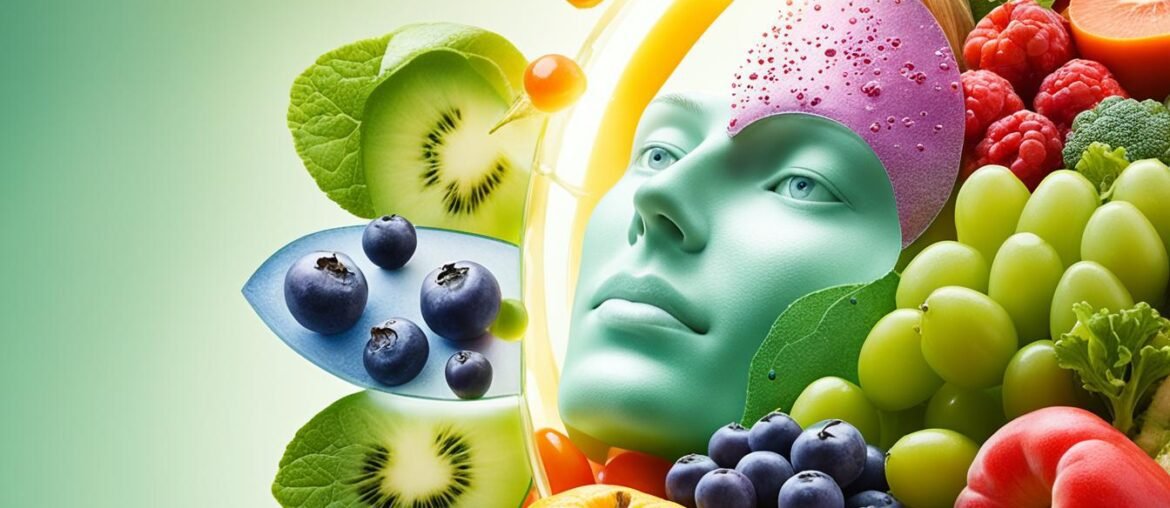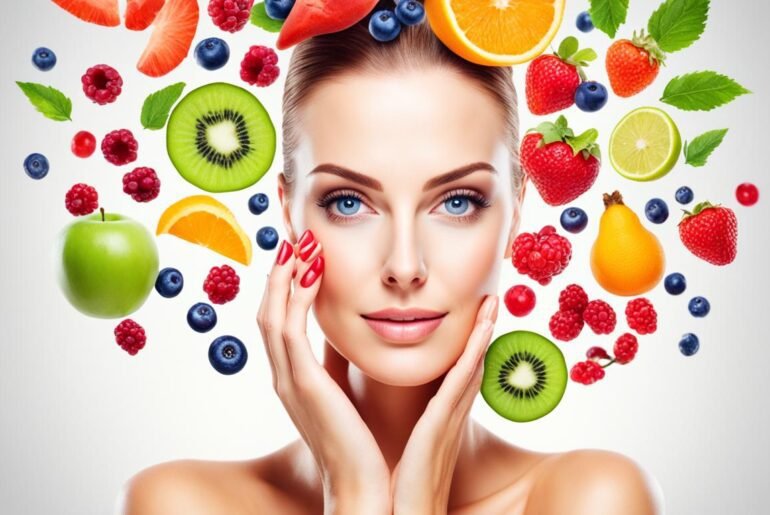Did you know that antioxidants can play a crucial role in skin repair and rejuvenation? It’s true! These powerful compounds have the ability to counteract the damaging effects of free radicals and oxidative stress, which can accelerate skin aging and contribute to various skin conditions.
Scientific studies have shown that antioxidants have numerous benefits for the skin, including reducing DNA damage from UV light, improving hydration, stimulating collagen and elastin production, reducing wrinkles and pigmentation, supporting healing processes, reducing inflammation, and promoting soft, youthful skin.
Now, let’s explore the science behind antioxidants and their role in skin repair, as well as how you can incorporate antioxidant-rich skincare products and foods into your routine for healthier, more radiant skin.
Key Takeaways:
- Antioxidants are essential for skin repair and rejuvenation.
- They help counteract the damaging effects of free radicals and oxidative stress.
- Scientific studies have shown that antioxidants have numerous benefits for the skin.
- Incorporating antioxidant-rich skincare products and foods can improve skin health.
- It’s important to choose the right antioxidants for your skin type and use them in moderation.
The Science Behind Antioxidants and Skin Repair.
Oxidative stress and the accumulation of free radicals in the skin are major contributors to aging and the development of various skin diseases, including skin cancer. Antioxidants play a vital role in neutralizing free radicals and protecting the skin from DNA damage caused by UV radiation. Additionally, they have been shown to reduce inflammation, promote collagen synthesis, and enhance the skin’s natural healing processes.
Antioxidants like vitamins A, C, and E, selenium, zinc, carotenoids, flavonoids, and glutathione have significant protective effects on the skin and can help prevent and repair damage caused by oxidative stress.
Scientific studies have consistently demonstrated the benefits of antioxidants for skin health. For example, vitamins A, C, and E have been found to have photoprotective properties, helping to combat the harmful effects of UV radiation on the skin. Carotenoids, flavonoids, and glutathione have also been shown to have antioxidant and anti-inflammatory effects, further contributing to skin repair and rejuvenation.
By incorporating antioxidant-rich skincare products and consuming a diet rich in these nutrients, individuals can support their skin’s repair and rejuvenation processes, preventing premature aging and protecting against skin diseases, including skin cancer.
Understanding Oxidative Stress and Free Radicals
Oxidative stress occurs when there is an imbalance between the production of free radicals and the body’s ability to neutralize them with antioxidants. Free radicals are unstable molecules that are formed as a byproduct of normal cellular processes, as well as from external sources such as UV radiation, pollution, and smoking. These highly reactive molecules can damage cells and contribute to various diseases, including skin disorders and cancers.
| Effects of Oxidative Stress | How Antioxidants Help |
|---|---|
|
|
|
|
|
|
By incorporating antioxidant-rich skincare products and consuming a diet rich in antioxidants, individuals can support their skin’s defenses against oxidative stress, reduce the signs of aging, and maintain a healthy complexion.
Antioxidants in Skincare Products.

Many skincare products on the market today contain antioxidants as active ingredients. These powerful compounds help protect the skin from harmful free radicals and oxidative stress, promoting skin repair and rejuvenation.
One popular type of antioxidant found in skincare products is retinoids, which are derived from vitamin A. Retinoids have been widely recognized for their anti-aging properties, helping to reduce the appearance of wrinkles, improve skin texture, and stimulate collagen production.
Vitamin C is another potent antioxidant commonly used in skincare products. This vitamin is known for its ability to brighten the skin, improve uneven skin tone, and fade pigmentation. Additionally, vitamin C offers antioxidant protection against UV damage and helps promote the synthesis of collagen for firmer, more youthful-looking skin.
Vitamin E, on the other hand, provides protection against skin cancer and also plays a role in replenishing other antioxidants, such as vitamin C, in the skin. It helps to moisturize and nourish the skin, leaving it softer and smoother.
The benefits of antioxidants in skincare products:
- Protect the skin from free radicals and oxidative stress
- Reduce the appearance of wrinkles and fine lines
- Even out skin tone and improve pigmentation
- Stimulate collagen production for firmer skin
- Moisturize and nourish the skin
When choosing skincare products, it is important to consider your skin type and specific skincare concerns. Look for products that contain retinoids, vitamin C, vitamin E, or a combination of these antioxidants to maximize the skin rejuvenation benefits.
Remember, it’s always recommended to consult a dermatologist or skincare professional for personalized skincare advice tailored to your specific needs.
Antioxidants in Foods.
Antioxidants are naturally abundant in a variety of foods, especially fruits, vegetables, herbs, and spices. These antioxidant-rich foods provide a wide range of benefits for skin repair and rejuvenation. Incorporating them into your diet can help support your skin’s overall health and promote a youthful complexion.
Some of the antioxidant-rich foods include:
- Berries: Gooseberries, bilberries, blackberries, and blueberries are known for their high antioxidant content.
- Pomegranates: Packed with antioxidants, pomegranates offer numerous skincare benefits.
- Apples and Lemons: These fruits provide a good dose of antioxidants, along with other nutrients that are beneficial for the skin.
- Leafy Greens: Vegetables like kale and broccoli are rich in antioxidants, vitamins, and minerals that promote skin health.
- Hot Spices: Chili peppers and other spices like chili powder offer antioxidant properties that can support skin repair.
- Olives, Beets, and Peppers: These colorful vegetables contain antioxidants that can help combat oxidative stress in the skin.
- Beverages: Coffee, green tea, and even red wine are known for their antioxidant content, which can enhance skin health.
By incorporating these antioxidant-rich foods into your daily meals, you can provide your skin with the necessary nutrients to support its repair and rejuvenation processes from the inside out.
Choosing Antioxidant-Rich Skincare Products.

When it comes to selecting skincare products, it’s important to consider your skin type and specific needs. Whether you have sensitive, normal, dry, oily, or combination skin, choosing the right products can make a significant difference in maintaining a healthy and radiant complexion.
If you have sensitive skin:
- Avoid products that contain retinoids, as they can potentially cause irritation.
- Opt for gentle, fragrance-free formulations specifically designed for sensitive skin.
- Look for skincare products labeled as hypoallergenic and non-comedogenic.
Regardless of your skin type, sunscreen is a non-negotiable component of any skincare routine:
- Choose a broad-spectrum sunscreen with an SPF of 30 or higher to protect your skin from harmful UV rays.
- Apply sunscreen generously on all exposed skin, including your face, neck, and hands.
- Reapply sunscreen every two hours, or more frequently if you’re swimming or sweating.
For a simplified skincare routine:
- Consider using a moisturizer that includes SPF, allowing you to moisturize and protect your skin from the sun in one step.
- A moisturizer with SPF is especially convenient for those with busy lifestyles or anyone looking to streamline their skincare regimen.
By being mindful of your skin type, avoiding potential irritants, and incorporating sunscreen into your daily routine, you can ensure that your skincare regimen is both effective and tailored to your skin’s specific needs.
| Skin Type | Recommended Skincare Products |
|---|---|
| Sensitive Skin | Gentle, fragrance-free cleansers, moisturizers for sensitive skin, and sunscreen formulated for sensitive skin |
| Normal Skin | Mild cleansers, hydrating moisturizers, antioxidants serums, and broad-spectrum sunscreen |
| Dry Skin | Creamy cleansers, rich moisturizers, hydrating serums with hyaluronic acid, and sunscreen with moisturizing properties |
| Oily Skin | Gel-based cleansers, lightweight moisturizers, oil-free serums, and oil-free or mattifying sunscreen |
| Combination Skin | Balancing cleansers, lightweight moisturizers, targeted serums for specific skin concerns, and broad-spectrum sunscreen |
Potential Drawbacks of Antioxidant Use.
While antioxidants offer numerous benefits for skin repair and rejuvenation, it is important to use them in moderation and avoid excessive doses to prevent potential adverse effects.
Research on the impact of antioxidant skincare products on skin cells is still ongoing, and evidence regarding their effectiveness varies.
Therefore, it is essential to seek medical advice before using large doses of antioxidants for prolonged periods. By following recommended usage guidelines and consulting with a healthcare professional, individuals can safely enjoy the benefits of antioxidants without risking any potential drawbacks.
Antioxidants and Skin Diseases.
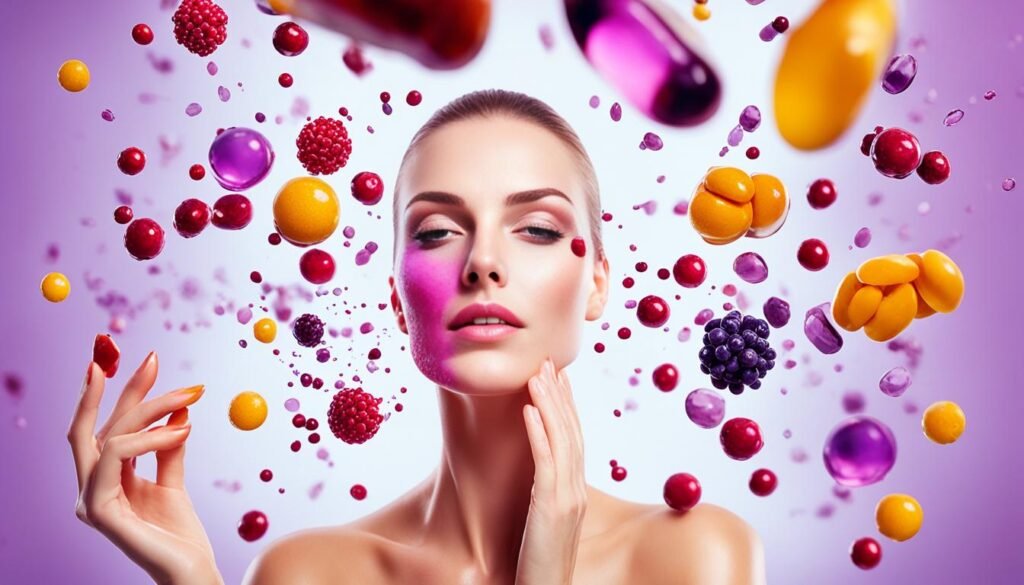
Antioxidants play a significant role in preventing and managing various skin conditions. Research suggests that vitamin E, in particular, may have potential benefits in improving skin diseases such as vitiligo, atopic dermatitis, and acne. Patients with these conditions have been found to have lower levels of vitamin E, highlighting the importance of vitamin E supplementation in their treatment.
However, it is important to note that further research is needed to fully evaluate the effectiveness of vitamin E and other antioxidants in treating skin diseases. Ongoing studies aim to provide a deeper understanding of how antioxidants can be utilized to alleviate symptoms and promote skin repair.
To explore the potential benefits of antioxidants in managing skin diseases, it is crucial to delve into the specific antioxidants, their mechanisms of action, and their compatibility with different skin conditions.
Vitamin E and Skin Diseases
Vitamin E, a potent antioxidant, has been the focus of several studies investigating its role in skin health and disease management. In regard to vitiligo, a condition characterized by depigmentation, vitamin E supplementation has shown promising results in reducing symptoms and promoting repigmentation.
For individuals with atopic dermatitis, a chronic inflammatory skin condition, vitamin E has been found to have a positive effect on skin barrier function and reduce inflammation. Similarly, in acne-prone individuals, vitamin E has demonstrated potential benefits in reducing inflammatory lesions and improving overall skin health.
While these findings provide valuable insights, further research is necessary to determine the optimal dosage, duration, and effectiveness of vitamin E supplementation for different skin diseases. Additionally, exploring the synergistic effects of vitamin E with other antioxidants may yield more comprehensive solutions for managing these conditions.
Advancements in Antioxidant Research
Ongoing research endeavors continue to expand our understanding of antioxidants and their potential role in managing skin diseases. Scientists are exploring the synergistic effects of antioxidants, such as vitamin E, with other compounds and therapies to maximize their benefits.
By uncovering the intricate mechanisms by which antioxidants interact with skin cells and the underlying pathology of various skin diseases, researchers aim to develop targeted approaches that effectively harness the power of antioxidants for therapeutic purposes.
Common Skin Diseases and Associated Antioxidants
| Skin Disease | Associated Antioxidant |
|---|---|
| Vitiligo | Vitamin E |
| Atopic Dermatitis | Vitamin E |
| Acne | Vitamin E |
While current research shows promise, it is important to consult healthcare professionals and dermatologists for personalized advice and treatment options.
Continued exploration of antioxidants and their role in skin diseases will pave the way for innovative therapeutic strategies, offering hope for individuals with these conditions.
The Key Antioxidants for Skin Health.
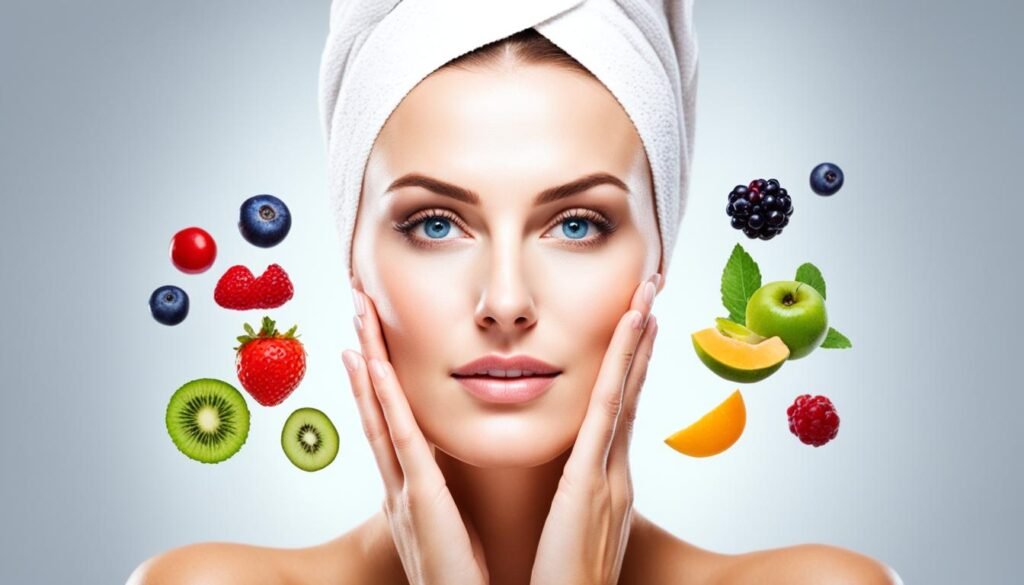
Several key antioxidants play a vital role in promoting skin health and repair. By incorporating these antioxidants into your skincare routine and diet, you can support your skin’s overall well-being and rejuvenation.
Vitamins A, E, and C
Vitamins A, E, and C are powerful antioxidants that offer numerous benefits for your skin. Vitamin A helps stimulate collagen production and improve skin tone and texture. Vitamin E protects the skin from oxidative damage and helps maintain its natural moisture balance. Vitamin C brightens the complexion, reduces hyperpigmentation, and enhances skin’s natural defense against UV damage.
Minerals: Selenium, Zinc, and Copper
Minerals such as selenium, zinc, and copper also play a crucial role in skin health. Selenium acts as an antioxidant, protecting the skin from UV damage and preventing premature aging. Zinc supports collagen synthesis and plays a key role in wound healing. Copper helps in the production of collagen and elastin, promoting firmness and elasticity in the skin.
Carotenoids and Polyphenols
Carotenoids, including beta-carotene, lutein, and lycopene, are antioxidants found in various fruits and vegetables. They help protect the skin from harmful UV radiation and reduce the risk of photoaging. Polyphenols, such as curcumin and resveratrol, are plant compounds with potent antioxidant properties. They help combat inflammation and protect the skin from oxidative stress.
By ensuring an adequate intake of these key antioxidants through a balanced diet or supplementation, you can support your skin’s overall health and repair processes.
| Antioxidant | Sources |
|---|---|
| Vitamin A | Carrots, sweet potatoes, spinach, kale, and liver |
| Vitamin E | Almonds, sunflower seeds, spinach, avocados, and wheat germ |
| Vitamin C | Oranges, strawberries, kiwi, bell peppers, and broccoli |
| Selenium | Brazil nuts, tuna, sardines, eggs, and whole grains |
| Zinc | Pumpkin seeds, beef, oysters, lentils, and chickpeas |
| Copper | Cashews, sesame seeds, oysters, dark chocolate, and mushrooms |
| Carotenoids | Carrots, tomatoes, sweet potatoes, kale, and papaya |
| Polyphenols | Green tea, berries, dark chocolate, turmeric, and red wine |
Topical Vitamin C as an Antioxidant.
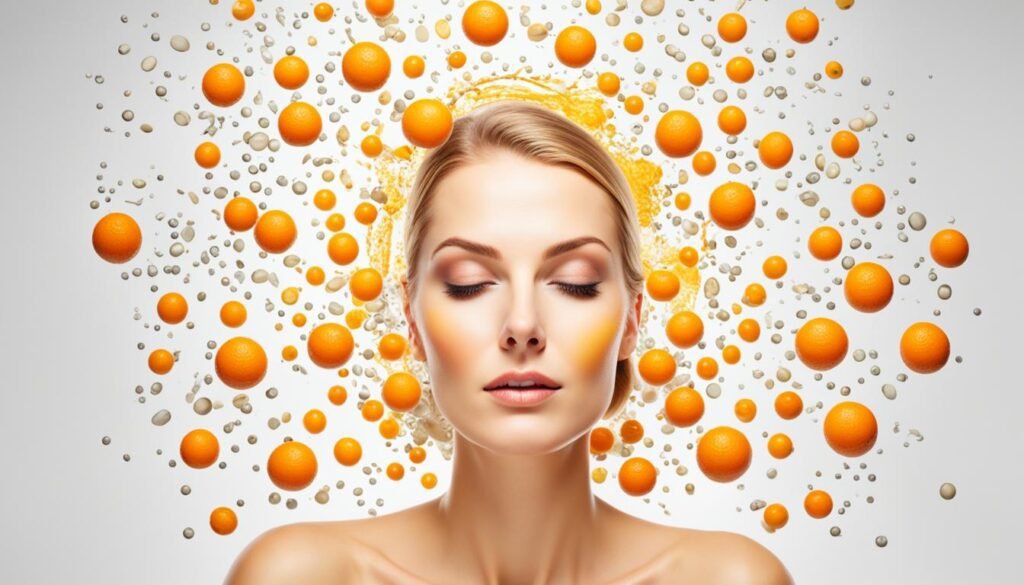
Topical vitamin C has gained significant popularity as a powerful antioxidant in skincare products. Its remarkable properties make it an essential ingredient for addressing various skin concerns like anti-aging and anti-pigmentation, while also offering sun protection and replenishing vitamin E levels in the skin.
Vitamin C is widely recognized for its anti-aging benefits. The antioxidant properties of topical vitamin C can help neutralize free radicals, reducing the signs of aging such as fine lines, wrinkles, and sagging skin. It stimulates collagen production, improving skin elasticity and firmness for a more youthful appearance.
Additionally, vitamin C has been shown to combat hyperpigmentation by inhibiting melanin production. It can help fade dark spots, acne scars, and uneven skin tone, resulting in a more even complexion.
Another significant advantage of topical vitamin C is its ability to protect the skin from the damaging effects of the sun’s UV radiation. It helps prevent photoaging and sunburn by scavenging free radicals generated by UV exposure, reducing oxidative stress on the skin.
Furthermore, topical vitamin C plays a crucial role in replenishing vitamin E levels in the skin. Vitamin E is a vital antioxidant that protects against cellular damage, and its levels can be depleted when the skin is exposed to oxidative stress. By replenishing vitamin E, vitamin C ensures the skin’s defense against further damage and supports its repair processes.
To fully harness the benefits of topical vitamin C, it is important to choose high-quality skincare products that contain stable and bioavailable forms of this antioxidant. Look for products with a sufficient concentration of vitamin C and consider the packaging to ensure its stability and efficacy. Incorporating topical vitamin C into your skincare routine can support your skin’s repair and rejuvenation, promoting a healthier and more radiant complexion.
Benefits of Topical Vitamin C:
- Promotes collagen production for firmer, more elastic skin
- Reduces fine lines, wrinkles, and sagging
- Fades dark spots, acne scars, and hyperpigmentation
- Offers sun protection by neutralizing free radicals
- Replenishes vitamin E levels in the skin
Recommended Skincare Products with Topical Vitamin C:
| Product | Description |
|---|---|
| Brand X Vitamin C Serum | A potent serum containing 20% vitamin C for maximum efficacy. Provides antioxidant protection, brightens skin, and reduces signs of aging. |
| Brand Y Vitamin C Moisturizer | A lightweight moisturizer infused with vitamin C to hydrate and replenish the skin. Fights the signs of aging and improves overall skin tone. |
| Brand Z Vitamin C Eye Cream | A targeted eye cream enriched with vitamin C to reduce dark circles, puffiness, and fine lines around the delicate eye area. |
Remember, always perform a patch test before using any new skincare products, especially those containing vitamin C. Consult a dermatologist or skincare professional to determine the most suitable regimen for your skin type and needs.
Conclusion.
Antioxidants play a vital role in skin repair and rejuvenation. By incorporating antioxidant-rich skincare products and consuming a healthy diet that includes a variety of fruits, vegetables, and other antioxidant-rich foods, individuals can support their skin’s overall health and promote youthful, radiant skin. However, it is important to choose skincare products and use antioxidants in moderation, considering one’s skin type and potential sensitivities. By adopting a holistic approach to skincare and considering the benefits of antioxidants, individuals can enhance their skin’s natural repair processes and maintain a healthy complexion.
References.
1. w13590–w13590. [PubMed] [Google Scholar] (First source)
2. Pelle E, Mammone T, Maes D, Frenkel K. Keratinocytes act as a source of reactive oxygen species by transferring hydrogen peroxide to melanocytes. J Invest Dermatol. 2005;124:793–797. [PubMed] [Google Scholar] (First source)
3. Ryan AS, Goldsmith LA. Nutrition and the skin. Clin Dermatol. 1996;14:389–406. [PubMed] [Google Scholar] (First source)
4. Rutkowski M, Grzegorczyk K. Adverse effects of antioxidative vitamins. Int J Occup Med Environ Health. 2012;25:105–121. [PubMed] [Google Scholar] (First source)
5. Forman HJ, Fukuto JM, Miller T, Zhang H, Rinna A, Levy S. The chemistry of cell signaling by reactive oxygen and nitrogen species and 4-hydroxynonenal. Arch Biochem Biophys. 2008;477:183–195. [PMC free article] [PubMed] [Google Scholar] (First source)
6. Marini A, Jaenicke T, Grether-Beck S, Le Floc’h C, Cheniti A, Piccardi N. Prevention of polymorphic light eruption by oral administration of a nutritional supplement containing lycopene, β-carotene, and Lactobacillus johnsonii: results from a randomized, placebo-controlled, double-blinded study. Photodermatol Photoimmunol Photomed. 2014;30:189–194. [PubMed] [Google Scholar] (First source)
7. Schroeder P, Krutmann J. What is needed for a sunscreen to provide complete protection. Skin Therapy Lett. 2010;15:4–5. [PubMed] [Google Scholar] (Second source)
8. Zastrow L, Groth N, Klein F, Kockott D, Lademann J, Ferrero L. UV, visible and infrared light. Which wavelengths produce oxidative stress in human skin? Hautarzt. 2009;60:310–317. [PubMed] [Google Scholar] (Second source)
9. Nichols J.A., Katiyar S.K. Skin photoprotection by natural polyphenols: Anti-inflammatory, antioxidant and DNA repair mechanisms. Arch. Dermatol. Res. 2010;302:71–83. doi: 10.1007/s00403-009-1001-3. [PMC free article] [PubMed] [Google Scholar] (Second source)
10. Michalak M., Glinka R. Sources of vegetable dyes and their use in cosmetology. Pol. J. Cosmetol. 2017;20:196–205. [Google Scholar] (Third source)
11. Wojdyło A., Oszmiański J., Czemerys R. Antioxidant activity and phenolic compounds in 32 selected herbs. Food Chem. 2007;105:940–949. (Third source)
FAQ
What role do antioxidants play in skin repair?
Antioxidants play a crucial role in skin repair by counteracting the damaging effects of free radicals and oxidative stress, which can accelerate skin aging and contribute to various skin conditions.
How do antioxidants protect the skin from damage?
Antioxidants help neutralize free radicals and protect the skin from DNA damage caused by UV radiation, reducing inflammation, promoting collagen synthesis, and enhancing the skin’s natural healing processes.
Which antioxidants are commonly used in skincare products?
Retinoids derived from vitamin A, vitamin C, and vitamin E are commonly used antioxidants in skincare products for their anti-aging and skin rejuvenation properties.
What foods are rich in antioxidants?
Fruits like berries, pomegranates, apples, and vegetables such as kale, broccoli, and spices like turmeric and green tea are rich in antioxidants.
How can I choose antioxidant-rich skincare products?
Consider your skin type and look for products that contain antioxidants like retinoids, vitamin C, and vitamin E. Additionally, wearing sunscreen with an SPF of 30 or higher is crucial for protecting the skin from further damage.
Are there any potential drawbacks to using antioxidants?
Using large doses of antioxidants for prolonged periods may have adverse effects. It is essential to follow recommended usage guidelines and seek medical advice before using excessive amounts.
Do antioxidants have benefits for skin diseases?
Some studies suggest that certain antioxidants like vitamin E may have potential benefits in managing skin conditions like vitiligo, atopic dermatitis, and acne, but further research is still needed.
What are the key antioxidants for skin health?
Vitamins A, E, C, as well as minerals like selenium, zinc, and copper, along with carotenoids and polyphenols, are key antioxidants that support skin health.
How does topical vitamin C benefit the skin?
Topical vitamin C is known for its anti-aging and anti-pigmentation properties, as well as its ability to protect the skin from sun damage and replenish vitamin E levels in the skin.
How can antioxidants promote youthful skin?
By incorporating antioxidant-rich skincare products and consuming a healthy diet rich in antioxidants, individuals can support their skin’s repair processes and maintain a youthful complexion.

